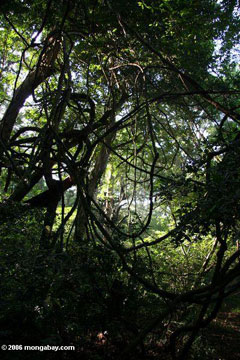1.2 million ha of Congo rainforest certified for sustainable forestry
1.2 million ha of Congo rainforest certified for sustainable forestry
mongabay.com
August 6, 2008
|
|
More than one million hectares of Congo Basin forests have been certified under a sustainable forestry scheme, reports WWF, an environmental group that has supported the initiative.
Forest Stewardship Council (FSC) certification has now been achieved for forestry operations on 1.2 million hectares, according to a statement from the group. SEFAC, Transformation Reef Cameroon (TRC) and WIJMA in Cameroon and CIB in the Republic of Congo are the logging companies whose operations have achieved the standard.
“With rampant illegal logging, vague logging concession boundaries and massive blocks of pristine forest destined for the chainsaw, this is a laudable step towards avoiding an ecological disaster,” says James P. Leape, Director General of WWF. “While the certified forests will have to be maintained according to acceptable international standards, there is urgent need for other timber business operations in the region to adopt responsible forest management practices in order to ensure the conservation of this unique forest ecosystem for the benefit of people in the region and the world.”
“Illegal forest exploitation and forest crimes are largely due to poor governance and insufficient law enforcement,” said Laurent Somé, WWF Central Africa Regional Programme Office (CARPO)’s Representative. “WWF also recognizes that responsible forest management plays an important role in the economic growth of tropical countries and reducing poverty in forest communities.
 Rainforest in Uganda. Photo by Rhett A. Butler. |
“WWF is convinced that the adoption of responsible forestry schemes by logging companies will contribute greatly to the conservation of the Congo Basin forests and towards improving the national economy and also improve the livelihoods of local communities,” Mr Some said. “For the success of responsible forestry in the Congo basin, there is a high need for government to set up enabling conditions that include enacting adequate legislation and enforcement, and promoting good governance while providing support to responsible forestry initiatives.”
While WWF has touted FSC-certification as a way to promote sustainable harvesting of rainforest timber, some environmental groups say the standards are weak and poorly enforced.
Simon Counsell, director of the Rainforest Foundation UK, says that in some cases FSC certificates have been issued to companies with poor environmental and social records. Glenn Barry, an activist with Forests.org, has argued that “the organization is plagued with conflicts of interest, poor quality assurance mechanisms, and generally has failed the world’s forests.” The World Rainforest Movement has further criticized FSC certification decisions.
Nevertheless WWF expects that 7 million hectares of forest in the Congo Basin will be certified by 2012.